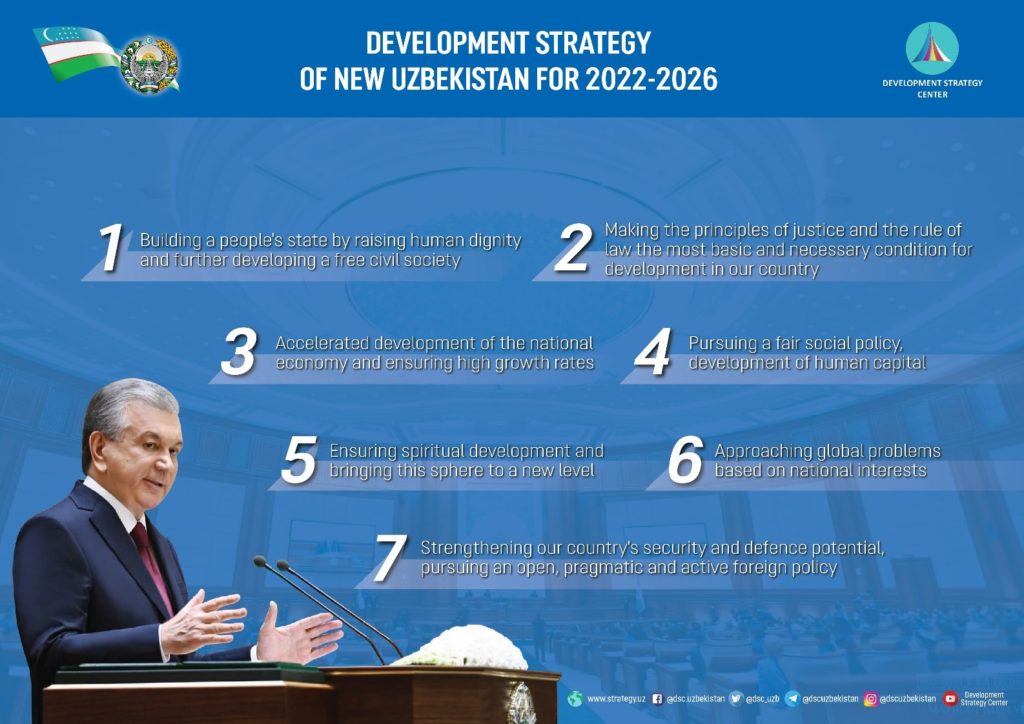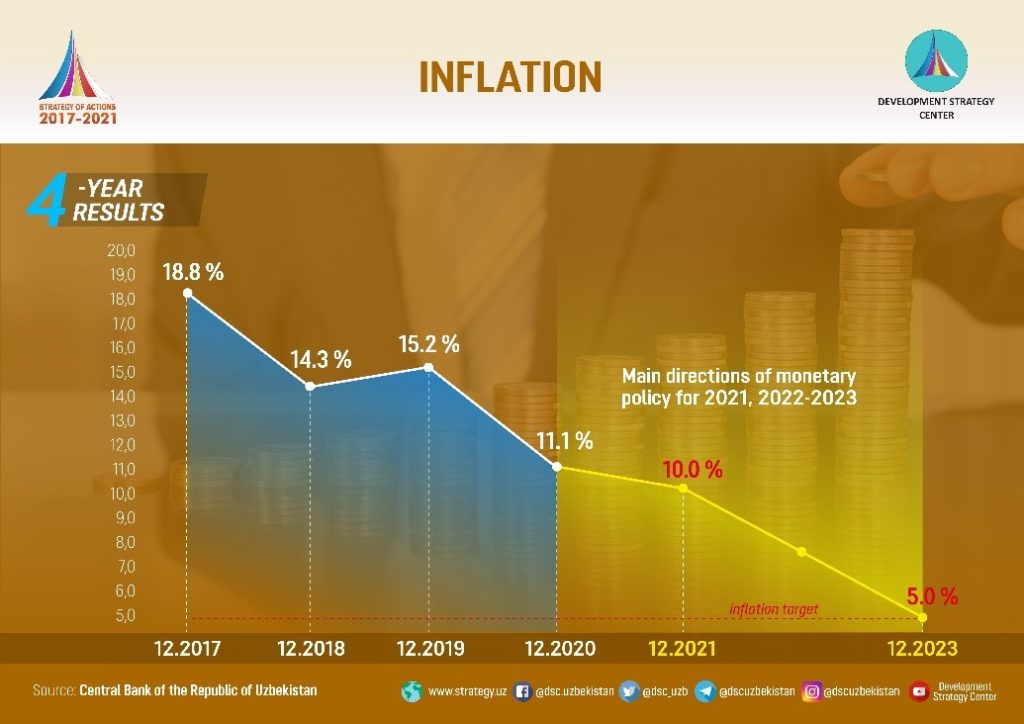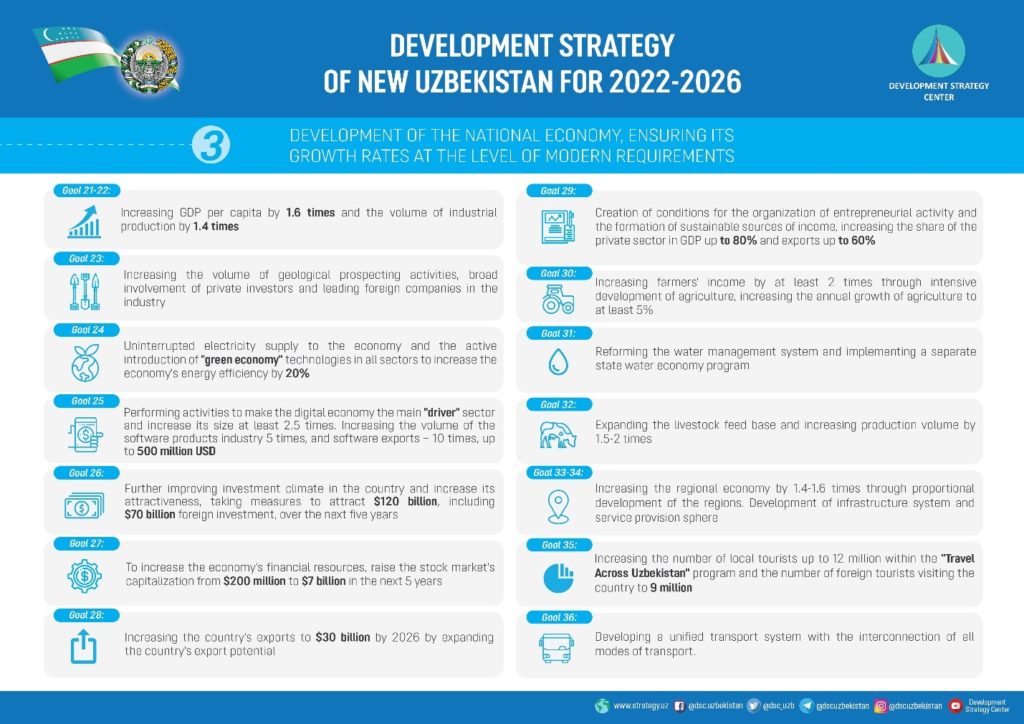Uzbekistan, which will celebrate the 35th anniversary of its independence in 2026, has set 2026 targets and adopted the 2022-2026 Development Strategy, based on its 30 years of experience and experience as of 2022. It is definite that this strategy is making a powerful map for reaching the aims of constructing New Uzbekistan, under the visionary leadership of Mr Shavkat Mirziyoyev, who has become the President in 2016.
Uzbekistan based Development Strategy Center’s (DSC)[1] studies about that roadmap is quite illuminating. Especially the President of DSC, Eldor Tulkayov’s writings, which have been published in several languages, are quite significant for understanding the issue. In this analysis, targets of Uzbekistan for 2026 will be examined, based on Tukayov’s study titled “Economic Development as a Priority in the Development Strategy of Uzbekistan for 2022-2026” published on the website of Ankara Center for Crisis and Policy Studies (ANKASAM). It can be seen the targets in question in the infographic in Image 1 in its most summary form.
Image 1: Uzbekistan’s targets for 2026

As the whole world appreciates, New Uzbekistan, which accelerated its integration with the international community under the leadership of Mr Mirziyoyev and came to the fore with its peaceful rhetoric, is trying to crown the benefits of its balance-based multi-vector foreign policy in terms of its 2026 goals, as well. On the basis of those aims, there is the desire for creating a strong and stable state and provide a prosperous life for the Uzbek public. Therefore, the Tashkent administration is quite decisive “Third Renaissance” period to rule successfully
The 2022-2026 Development Strategy, which was declared as a reflection of the strong will, is emerged out of inclusive public opinion research for clarifying the needs of the people. Therefore, the route for the future of Uzbekistan is drawn by the Uzbek people as well.
Strategy Document envisages supporting small and medium-sized enterprises, attracting foreign investments to Uzbekistan to create employment in a way that will eliminate unemployment as a problem, speeding up the privatization processes by combating monopoly in order to adapt to the free market economy, and ultimately increasing the living standards of the people by reducing inflation. [2]
Image 2: Graphic of Uzbekistan’s Inflation Rate

In that sense, Uzbekistan has already achieved economic aims since Mr Mirziyoyev has become the President. For instance, as it can be understood by Image 2, the inflation, which was 18.8% in December 2017, dropped to 10% in December 2021. Thusly for the last 3 years, Tashkent has become successful in terms of economics. Of course, this situation is a solid result of decisive steps which was taken under the leadership of Mr Mirziyoyev. Now, it is aimed that the inflation will be decreased to 5% until December 2023, because of planned policies.[3]
In that context, the Tashkent administration is planning to support the sectors like the chemistry industry, drugs sector, energy projects, studies on switching into renewable energy, and the furniture and tourism sector. In addition, digitalism and switching into the digital economy was paid attention to by the Tashkent administration. Thus Uzbekistan is not accepting falling behind the technological era.
On the other hand, one of the goals of Uzbekistan is to be a self-sufficient country and to ensure “food security”. In this context, Tashkent Administration is preparing for creating support and incentive for the farming and agriculture sectors. Uzbekistan’s plan for sector-based development can be seen in the infographic in Image 3.
Image 3: 2022-2026 Development Plan of Uzbekistan

As a result of all the initiatives, Uzbekistan is waiting for 1,6 times of expansion on Gross Domestic Product (GDP). This will mean that the national income will reach 4.000 dollars per person.[4] Therefore, the GDP growth rate will be 6,5% if Uzbekistan reaches its aims of development.
Striving to be one of the leading actors of the global economy in line with its 2026 goals, Uzbekistan also wants to be accepted into the World Trade Organization (WTO). In this direction, the Tashkent administration also supports the policies it carries out to achieve the country’s economic goals with political reforms. As a matter of fact, Mr Mirziyoyev, who succeeded in making his country one of the respected states of the world and focusing on breakthroughs, acts with an approach that makes the rule of law a fundamental priority, in accordance with the spirit of the “Third Renaissance”, and adopts transparency and justice as the main principle of the state. In this context, Uzbekistan clearly declares that it will continue its political and legal reform processes in line with its 2026 targets.
As a result, Uzbekistan supports the balanced multi-vector policy understanding that it implements in its foreign policy with liberalization moves in the context of rights and freedoms in domestic politics, and as an output of this, it is perceived as a reliable country for foreign investors. In this context, it can be said that New Uzbekistan will resolutely continue the steps it has taken since 2016 under the leadership of Mr Mirziyoyev. As a result of this, the country implements a development policy determined in the 2022-2026 Development Strategy and can be described as an “economic revolution”. The strategy is carried out with a liberalization trend in line with Tashkent’s foreign policy and domestic policy. The goal of these policies is to create a state where all Uzbeks can live in prosperity and peace.
[1] DSC, https://strategy.uz/, (Date of Accession: 17.02.2022).
[2] Eldor Tulyakov, “2022-2026 Özbekistan Kalkınma Stratejisi’nde Bir Öncelik Olarak Ekonomik Kalkınma”, ANKASAM, https://www.ankasam.org/2022-2026-ozbekistan-kalkinma-stratejisinde-bir-oncelik-olarak-ekonomik-kalkinma/, (Date of Accession: 19.02.2022).
[3] Ibid.
[4] “Strategy of New Uzbekistan for 2022-2026: Macroeconomic Stability”, Review, https://review.uz/en/post/strategiya-novy-uzbekistan-2022-2026-makroekonomicheskaya-stabilnost, (Date of Accession: 19.02.2022).

